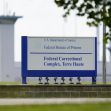Biden's latest executive order tackles the issue of privately operated criminal detention facilities. In his memorandum, President Biden seeks to reform the nation's current incarceration system by eliminating the use of these privately owned detention centers.
The memorandum explains in part, “To decrease incarceration levels, we must reduce profit-based incentives to incarcerate by phasing out the Federal Government’s reliance on privately operated criminal detention facilities.”
Biden's executive order will direct the Attorney General to cease new contract renewals with private prisons. However, this will only impact the Department of Justice facilities and not contracts with private detention centers that are in place by state governments or other government agencies like the Department of Homeland Security. Because of the restriction, this memorandum will only affect the 12 private prisons that house a little over 14,000 inmates.
Private vs Public Incarceration
With Over 2.3 million people incarcerated in American prisons, a small sliver of these individuals, just over 8% or 122,000 prisoners, are housed in private prisons. While the private prison influence over our nation's incarceration system is rather low, there has been a steady uptick in individuals being housed in private prisons.
The consensus that private prison facilities are better than state-run prison facilities in terms of safety for the American public is one that is not strongly supported by emerging data. Any research comparing the two can often be problematic because both differ in terms of what they have to offer and how effective they are at offering those resources. Biden explains in his memorandum,
"We must ensure that our Nation’s incarceration and correctional systems are prioritizing rehabilitation and redemption." Biden adds, "However, privately operated criminal detention facilities consistently underperform Federal facilities with respect to correctional services, programs, and resources. We should ensure that time in prison prepares individuals for the next chapter of their lives."
What has been consistent with our incarceration system is that our nation locks up more people per capita than any other country. In addition to criminals who are serving a sentence, there are over half-a-million who are behind bars because they are unable to afford bail and are simply waiting for their trial to begin. Many critics argue that by enabling for-profit prisons to have a place in our nation's incarceration system, there is little to no incentive in helping prisoners reform themselves and stay out of prison.
Critics See Challenges with Private Prison Reform
In his memorandum, Biden highlights the issues that plague the prison system as a result of private prisons. The memorandum explains, “[The] Department of Justice’s Office of Inspector General found in 2016, privately operated criminal detention facilities do not maintain the same levels of safety and security for people in the Federal criminal justice system or for correctional staff. We have a duty to provide these individuals with safe working and living conditions.”
The two major private prison groups in the nation, Geo and CoreCivic (formerly known as CCA) have made headlines because of their failure to meet basic safety, security, and health standards. The Geo Group was investigated in 2012 by the Department of Justice after hundreds of complaints came in accusing the company of cruel treatment of prisoners. Prison reform and advocacy groups, including the Sentencing Project, highlight that private prisons often provide inadequate quality of housing and treatment of inmates, as well as lower wages for staff, and in some private prisons, an inadequate amount of staff members to manage and maintain the prisoners.
The sentencing project also highlights how private prisons have become big lobbyists with governments striking deals that helped to increase profit revenue for the prisons. Between 2000 and 2016, the increase in private prison facilities has jumped 47%. Some states, especially border states like Arizona, have seen massive jumps like a 479% increase with the detention of illegal immigrants. Federal prison privatization has grown just as rapidly as state prison privatization.
Biden hopes to breathe new life into this Obama-era initiative. This reform in our nation's incarceration system is one of several actions Biden has initiated as part of his efforts toward racial equality.






